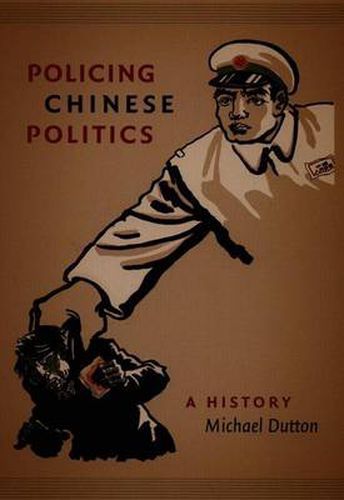Readings Newsletter
Become a Readings Member to make your shopping experience even easier.
Sign in or sign up for free!
You’re not far away from qualifying for FREE standard shipping within Australia
You’ve qualified for FREE standard shipping within Australia
The cart is loading…






In the first line of his Selected Works, Mao Zedong states, Who are our enemies, who are our friends, that is the question germane to the revolution. In Policing Chinese Politics, Michael Dutton argues that this friend/enemy dichotomy structured Chinese social order for much of the twentieth century, and the functioning of the Chinese police reflected this. Unlike western policing, which grew out of community efforts to control crime, modern Chinese policing–born in war and revolution–was founded to defend the Communist Party. Analyzing empirical evidence including extensive material from Chinese Public Security sources, Dutton tells the political history of modern China through the history of its policing practices. The deeply political character of the Chinese police was established in the 1920s, when the Communists were fighting against Chiang Kai-shek and the Nationalists. Despite being surrounded and badly outnumbered by their Nationalist enemies, the Communists dedicated themselves to self-destructive campaigns against the enemy within -real and imagined traitors to the Communist cause. Committing the police to ferreting out these internal enemies proved pivotal.For the next fifty years, the pursuit of counter-revolutionary enemies provided the governing principle of Chinese policing. This proved a surprisingly flexible mission, ranging from the political purges of the 1920s to the anti-drug and anti-prostitution sweeps of the 1950s to the prosecution of the Gang of Four and their followers in the 1970s. Dutton presents a timeline of this history in each chapter, relating political developments to contemporary policing practices. Political policing began to decline with the economic reforms of the 1970s, as policing stability replaced policing the revolutionary line. The history of the police force as a Party organ, however, continues to limit true reform.
$9.00 standard shipping within Australia
FREE standard shipping within Australia for orders over $100.00
Express & International shipping calculated at checkout
In the first line of his Selected Works, Mao Zedong states, Who are our enemies, who are our friends, that is the question germane to the revolution. In Policing Chinese Politics, Michael Dutton argues that this friend/enemy dichotomy structured Chinese social order for much of the twentieth century, and the functioning of the Chinese police reflected this. Unlike western policing, which grew out of community efforts to control crime, modern Chinese policing–born in war and revolution–was founded to defend the Communist Party. Analyzing empirical evidence including extensive material from Chinese Public Security sources, Dutton tells the political history of modern China through the history of its policing practices. The deeply political character of the Chinese police was established in the 1920s, when the Communists were fighting against Chiang Kai-shek and the Nationalists. Despite being surrounded and badly outnumbered by their Nationalist enemies, the Communists dedicated themselves to self-destructive campaigns against the enemy within -real and imagined traitors to the Communist cause. Committing the police to ferreting out these internal enemies proved pivotal.For the next fifty years, the pursuit of counter-revolutionary enemies provided the governing principle of Chinese policing. This proved a surprisingly flexible mission, ranging from the political purges of the 1920s to the anti-drug and anti-prostitution sweeps of the 1950s to the prosecution of the Gang of Four and their followers in the 1970s. Dutton presents a timeline of this history in each chapter, relating political developments to contemporary policing practices. Political policing began to decline with the economic reforms of the 1970s, as policing stability replaced policing the revolutionary line. The history of the police force as a Party organ, however, continues to limit true reform.